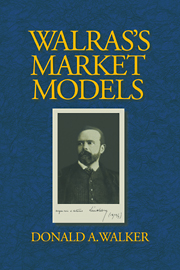Book contents
- Frontmatter
- Contents
- List of figures
- Preface
- Acknowledgments
- Introduction
- Part I The models of the mature phase
- 1 Walras's conception of a competitive market economy
- 2 The mature models: Not a normative scheme
- 3 The mature models of the barter of stocks of commodities
- 4 Institutions and participants in the model of monetary oral pledges markets
- 5 Disequilibrium and equilibrium in the model of monetary oral pledges markets
- 6 The structure of the mature nondurable consumer commodities model
- 7 The equilibrating processes in the mature nondurable consumer commodities model
- 8 The structure of the mature comprehensive model
- 9 The equilibrating processes in the mature comprehensive model
- 10 Walras and his critics on the maximum utility of new capital goods
- 11 The mature models of the money market
- 12 Iteration in the mature model of tatonnement
- 13 The mature model of the behavior of the entrepreneur
- 14 Walras versus Edgeworth on tatonnement processes
- Part II The models of the phase of decline
- References
- Collation of editions of the Eléments
- Index
10 - Walras and his critics on the maximum utility of new capital goods
Published online by Cambridge University Press: 05 May 2010
- Frontmatter
- Contents
- List of figures
- Preface
- Acknowledgments
- Introduction
- Part I The models of the mature phase
- 1 Walras's conception of a competitive market economy
- 2 The mature models: Not a normative scheme
- 3 The mature models of the barter of stocks of commodities
- 4 Institutions and participants in the model of monetary oral pledges markets
- 5 Disequilibrium and equilibrium in the model of monetary oral pledges markets
- 6 The structure of the mature nondurable consumer commodities model
- 7 The equilibrating processes in the mature nondurable consumer commodities model
- 8 The structure of the mature comprehensive model
- 9 The equilibrating processes in the mature comprehensive model
- 10 Walras and his critics on the maximum utility of new capital goods
- 11 The mature models of the money market
- 12 Iteration in the mature model of tatonnement
- 13 The mature model of the behavior of the entrepreneur
- 14 Walras versus Edgeworth on tatonnement processes
- Part II The models of the phase of decline
- References
- Collation of editions of the Eléments
- Index
Summary
A part of the history of economic thought that has not previously been examined is the reception and resulting modification of Walras's theorem on the maximum utility of new capital goods. The reactions of his contemporaries and his responses to them, hidden for decades in his correspondence, reveal why and how he modified his theorem. His efforts to explain it to his correspondents and to persuade them of its correctness are invaluable as aids to understanding it because the presentation of the theorem in the Eléments is in some places difficult to follow and in some places incomprehensible. In this chapter, the criticisms of the theorem and Walras's responses are examined and evaluated, and a reformulation of the theorem is given.
Introduction
This chapter examines the details of Walras's modeling during his mature phase of theoretical activity of the behavior of savers, the determination of the batch of capital goods that savings are used to construct, the way that capital goods are treated with respect to depreciation and insurance, and the relation between the amount of capital and the services that it renders. The chapter thus continues the study of Walras's mature model of the capitalgoods market as distinct from his model of the pricing of shares and bonds on the Bourse.
Walras presented a model of saving behavior in the first edition of the Eléments.
- Type
- Chapter
- Information
- Walras's Market Models , pp. 208 - 234Publisher: Cambridge University PressPrint publication year: 1996



